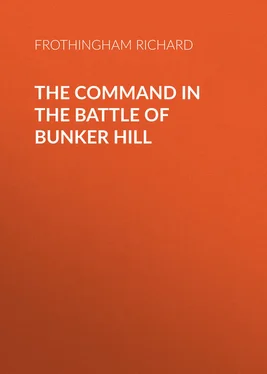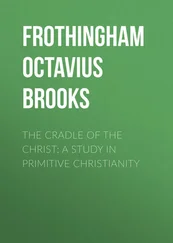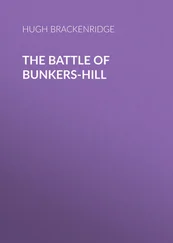Richard Frothingham - The Command in the Battle of Bunker Hill
Здесь есть возможность читать онлайн «Richard Frothingham - The Command in the Battle of Bunker Hill» — ознакомительный отрывок электронной книги совершенно бесплатно, а после прочтения отрывка купить полную версию. В некоторых случаях можно слушать аудио, скачать через торрент в формате fb2 и присутствует краткое содержание. Жанр: foreign_antique, foreign_prose, на английском языке. Описание произведения, (предисловие) а так же отзывы посетителей доступны на портале библиотеки ЛибКат.
- Название:The Command in the Battle of Bunker Hill
- Автор:
- Жанр:
- Год:неизвестен
- ISBN:нет данных
- Рейтинг книги:5 / 5. Голосов: 1
-
Избранное:Добавить в избранное
- Отзывы:
-
Ваша оценка:
- 100
- 1
- 2
- 3
- 4
- 5
The Command in the Battle of Bunker Hill: краткое содержание, описание и аннотация
Предлагаем к чтению аннотацию, описание, краткое содержание или предисловие (зависит от того, что написал сам автор книги «The Command in the Battle of Bunker Hill»). Если вы не нашли необходимую информацию о книге — напишите в комментариях, мы постараемся отыскать её.
The Command in the Battle of Bunker Hill — читать онлайн ознакомительный отрывок
Ниже представлен текст книги, разбитый по страницам. Система сохранения места последней прочитанной страницы, позволяет с удобством читать онлайн бесплатно книгу «The Command in the Battle of Bunker Hill», без необходимости каждый раз заново искать на чём Вы остановились. Поставьте закладку, и сможете в любой момент перейти на страницу, на которой закончили чтение.
Интервал:
Закладка:
Richard Frothingham
The Command in the Battle of Bunker Hill / With a Reply to 'Remarks on Frothingham's History of the / battle, by S. Swett'
THE COMMAND IN THE BATTLE OF BUNKER HILL
The preparation of a History of Charlestown – the occupation of leisure hours – led to large collections relative to the military events which occurred in the neighborhood of Boston at the commencement of the war of the revolution; but as a full account of them did not appropriately belong to so local a publication, and as no work had been issued containing a narrative, in much detail, of these interesting events, it was thought best to prepare the volume now before the public entitled History of the Siege of Boston. The old subject of the battle of Bunker Hill was so directly in my way that it could not be avoided; and as an apology for adding another to the narratives of this event, I determined to construct it, as much as possible, from contemporary materials.
In a faithful history of the battle, the question of command cannot properly be avoided. If it is not of the importance which many attach to it, still it is a curious question, about which there is much interest. It may be well, in the outset, to state clearly the matter at issue. The point is, was there a general officer detached to exercise a general command in the battle? There is great incongruity in the statements relative to this. It is stated (by Dr Whitney) that the detachment that fortified Breed's Hill was first put under the command of Gen. Putnam, that with it he took possession of this hill, and "ordered the battle from beginning to end;" or as another (Hon. John Lowell) states it, "General Putnam was detached for the purpose of fortifying it (Bunker Hill,) and Colonel Prescott was placed under his orders." On the other hand it is stated, that the orders to fortify Bunker Hill were given to Colonel Prescott, that the redoubt was raised by troops under his command, and that at no time during the whole affair did he act under, or receive an order from, a general officer. These statements are conflicting and cannot both be true. It is these rival claims as to Putnam and Prescott that constitute the delicacy and difficulty of the question.
Whoever investigates this subject must determine the kind of evidence that will be allowed to influence, mainly, the decision. There are numerous statements of soldiers who were in the battle, which were made forty years or more after it took place; after antipathy or gratitude had biassed them against or for their old commanders; after what they had heard and had come to believe, had unconsciously become interwoven with impressions of what they saw; and at a time of life, too, when exactness as to details of what took place so long before in such a scene, could not reasonably have been expected. These relations bear, in some points, the characteristics of tradition. They mostly harmonize as to the movements of companies or regiments, but differ, irreconcilably, on points bearing on the question of command. An argument, or an array of evidence, of equal authority and of equal positiveness, may be drawn out of this large reservoir in favor of Putnam, or of Prescott, or that there was no general commander, or that there was no command at all in the action. A somewhat laborious study, and critical collation of these statements forced upon me the conviction, that they ought not to be relied upon as leading authorities, and that it was idle to expect to arrive at a satisfactory result by depending on such sources of information. Hence diligent search was made for contemporary matter. Much caution and discrimination, however, are necessary in using such material. The first rumors of events are as apt to be as inaccurate as reminiscences of those events prepared after years have elapsed. But these rumors are followed by relations more reliable, and it is material of this sort that is the most valuable for historical purposes. It was such material that was selected. There are, however, but few facts bearing on the question of command in the many contemporary documents I have examined. Yet what is gleaned from them is important. Among the documents are letters from Generals Ward and Putnam, and Col. Prescott. The facts they supply are on some points conclusive.
Still, in a volume designed to be a simple record of authentic facts, and in a narrative of the battle prepared without conscious bias for or against either Putnam or Prescott as the commander, a labored argument on the question of command seemed neither desirable nor proper; and in disposing of it, it was thought best to state concisely, yet fairly, all the evidence of a contemporary nature relative to both that was known, state the conclusion it seemed to warrant, and leave the subject with the reader. This course, right or wrong, it is proper to say, after a remark of Mr Swett in the pamphlet which has occasioned this publication, was suggested solely by reflection on the authorities; and the gentlemen to whom he alludes are hereby exonerated from all responsibility, even for a suggestion, on this subject. And the "invincible prepossession," which seems to puzzle Mr Swett, it will be indeed "useless to inquire" into because it did not exist. One great reason for treating the subject in this way was, that the reader, with facts thus before him, might make up a theory to suit himself. This plan was, accordingly, carried out. And though Mr Swett is pleased to say that I labored "throughout a large portion" of the Siege of Boston to prove a certain "insignificant abstraction," yet, if so, it was unconscious labor, and to say so is ascribing to the effort far too much design. The evidence is merely stated and left to speak for itself. The reader will find it to occupy seven pages.
The conclusion reached is that there was no general commander, other than Gen. Ward, of the Bunker Hill battle. After quoting the evidence that bears in favor of Colonel Prescott, the following statement is made: – "The conclusion warranted by this evidence is, that the original detachment was placed under the orders of Colonel Prescott, and that no general officer was authorised to command over him during the battle." In other words, there is not only no evidence that a general officer was detached to exercise a general command, but contemporary authorities bear decidedly against such a conclusion.
Mr Samuel Swett has published a pamphlet entitled – " Who was the Commander at Bunker Hill. With Remarks on Frothingham's History of the Battle, with an Appendix ," in which he labors to overthrow this conclusion, and to establish the position that General Putnam was the authorized and general commander. Mr Swett is one of the old partizan writers on this subject. He began to write at a time (1818) when there was much excitement relative to the battle. The Analectic Magazine for February of that year had an account of it; the Port Folio for March had General Dearborn's extraordinary article, which opened up the long, bitter, and not yet closed controversy about General Putnam; Daniel Putnam's able and interesting letter soon (May) followed, marked by curious anecdote as well as by the indignant rebuke which filial duty dictated; General Dearborn (June) issued his "Vindication" with its imposing array of documents; in July, Hon. John Lowell made his thorough defence of Putnam's character, in the columns of the Centinel, and Hon. Daniel Webster, in the North American Review, contributed an invaluable article, drawing with indelible lines the characteristics of the battle, and defining, with remarkable accuracy, the positions of Putnam and Prescott; the subject had got mixed with party politics, and for six months the press had teemed with articles on one side or the other. It was, then, at an unfavorable period for healthy investigation, and after such a surfeit of the subject, that Mr Swett "from his attention to military subjects," "consented to describe the battle.
Читать дальшеИнтервал:
Закладка:
Похожие книги на «The Command in the Battle of Bunker Hill»
Представляем Вашему вниманию похожие книги на «The Command in the Battle of Bunker Hill» списком для выбора. Мы отобрали схожую по названию и смыслу литературу в надежде предоставить читателям больше вариантов отыскать новые, интересные, ещё непрочитанные произведения.
Обсуждение, отзывы о книге «The Command in the Battle of Bunker Hill» и просто собственные мнения читателей. Оставьте ваши комментарии, напишите, что Вы думаете о произведении, его смысле или главных героях. Укажите что конкретно понравилось, а что нет, и почему Вы так считаете.












